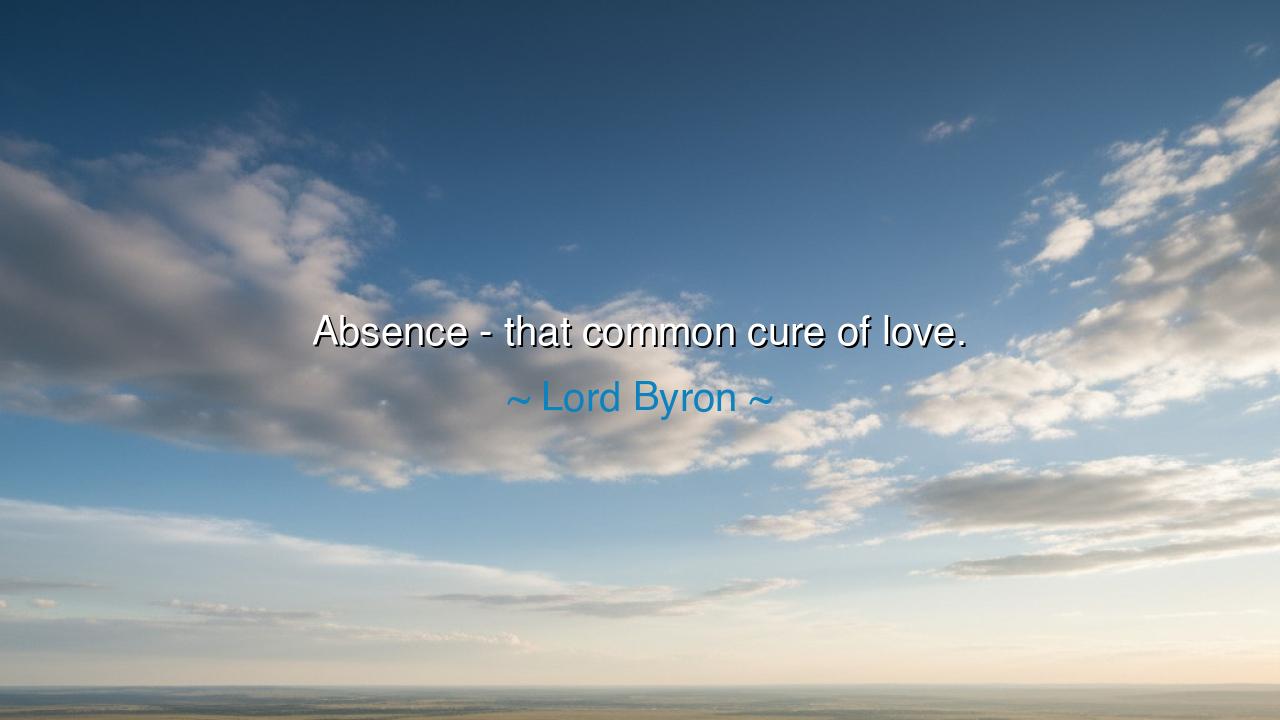
Absence - that common cure of love.






"Absence - that common cure of love." These poignant words from Lord Byron echo the timeless truth that distance, though painful, often brings clarity and perspective to the most intense of emotions, particularly love. Absence, in its deepest sense, is not merely the physical separation of two beings, but a space that allows time and reflection to cleanse the mind and heart. Love, when unrequited or strained, may find solace in absence, as distance allows the emotional intensity of love to either fade or transform into something more manageable. Byron’s words suggest that while love may burn brightly in the presence of a loved one, it is often through absence that we see love’s true nature — whether it will survive the test of time or dissolve in the face of separation.
The ancients recognized the complexity of love and the role absence played in it. In Greek mythology, the love between Orpheus and Eurydice is a tale steeped in absence. After losing Eurydice to the underworld, Orpheus’s love was so intense that it drove him to defy death itself in an attempt to bring her back. Yet, the very moment he turned to look at her before reaching the surface, their reunion was lost. This tragic tale illustrates how absence, particularly unwanted absence, can transform love into something painful, even destructive. Yet it also speaks to the space that absence creates for self-reflection. Through his grief, Orpheus was forced to confront the limits of his love and the emotional turmoil absence can bring.
In the Roman tradition, the poet Ovid explored the role of absence in love in his work Ars Amatoria. He suggested that distance could, paradoxically, rekindle desire. As Ovid wrote, the time spent apart could increase longing, allowing lovers to reassess their feelings and potentially come to a deeper appreciation of one another. For the Romans, absence was seen not always as a curse, but as a necessary pause — a way for lovers to either grow closer or grow apart. This duality of absence as both a remedy and a risk speaks to Byron’s understanding of love’s fragile nature, where time apart can both heal and diminish the bond.
Consider the relationship of Napoleon Bonaparte and Josephine, whose love was both intense and burdened by separation. Napoleon, often away on military campaigns, was deeply in love with Josephine, and yet their relationship was marked by long periods of absence. For Napoleon, absence deepened his attachment, but for Josephine, it became a source of frustration and doubt. Their love, though genuine, was weakened by time apart, and eventually, they were forced to separate. Napoleon’s desire for Josephine, despite their separation, shows how absence can bring both desire and heartache — an example of how Byron’s “cure” of love can both heal and harm. In this case, absence caused their love to both falter and transform over time, as it often does in relationships burdened by distance.
In the modern world, we too experience the cure of love through absence. Think of the countless relationships that struggle through the distant periods of life — whether through separation, physical distance, or even emotional withdrawal. Love, in these moments, is forced to evolve. Absence provides the space to either reignite a relationship with renewed clarity or to allow it to fade. Many have experienced the dissipation of love after spending time apart from a partner, realizing that their feelings were perhaps more about proximity than genuine affection. Similarly, others find that absence allows their love to grow deeper, as the desire and appreciation for the other person intensify during times of separation.
The lesson from Byron’s quote is clear: absence is a powerful force, both healing and revealing. It is through distance that we often gain a true understanding of our emotions and the depth of our connections. Whether we long for the return of a loved one or find that the absence brings a sense of relief, time apart allows us to reflect and reassess. In relationships, absence can be both a test and a catalyst for growth. Just as Orpheus and Eurydice learned the limits of love through absence, we too must recognize that love is not constant and that sometimes, time apart helps us understand what it means to love truly and deeply.
Therefore, my children, understand that absence is not something to be feared, but a force that will reveal the truth of your heart. Whether it strengthens or weakens love, it will provide the clarity needed to see whether the connection is built on genuine affection or merely the illusion of proximity. Embrace absence when it comes, for it can be the cure you need, allowing you to either heal from a relationship or grow in a love that will endure. Let distance teach you the depths of your feelings, and be willing to embrace the lessons it offers. For in the space of absence, we often find the truths that our hearts need most.






AAdministratorAdministrator
Welcome, honored guests. Please leave a comment, we will respond soon